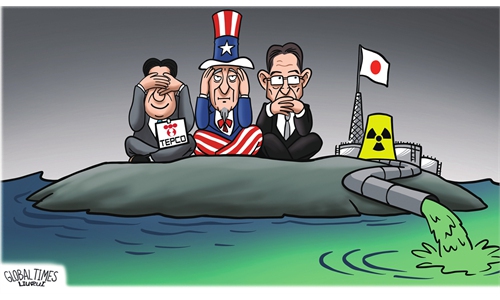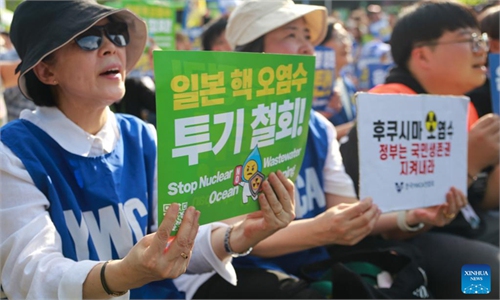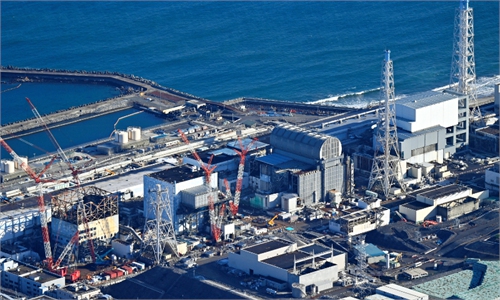Experts call for long-term, joint seawater monitoring to collect prosecution evidence as radioactive substance detected for first time near Fukushima N-Plant

Japan's reckless dumping of nuclear wastewater poses a grave danger to Earth. Cartoon: Carlos Latuff
As Japan has detected the radioactive substance tritium for the first time after it started dumping the nuclear-contaminated wastewater, Chinese experts on Sunday called for a long-term and joint monitoring program by international community on the radioactive substances in the seawater to collect and accumulate evidence for future prosecution against Japan.
Ten becquerels per liter of tritium was detected in a seawater sample taken on Thursday about 200 meters north of the Fukushima Daiichi nuclear power plant's underwater discharge tunnel, which is the first time that the radioactive material was detected in a seawater sample since Japan started the dumping of the nuclear-contaminated wastewater into the Pacific Ocean on August 24, the Japan News reported.
According to Kyodo News, Tokyo Electric Power Company (TEPCO) said the detection of tritium can be considered as affected by the dumping but without any security problem.
As TEPCO and Japan's Environment Ministry claimed that tritium levels in seawater sampled at sites near the plant were below the detectable limit, Chang Yen-chiang, director of the Yellow Sea and Bohai Sea Research Institute of Dalian Maritime University, told the Global Times on Sunday that "time" is the key factor in monitoring radioactive substances.
"It is not long since Japan began dumping the nuclear-contaminated wastewater into sea, so it is normal that we would see the current low levels of the detected radioactive substances," Chang noted, saying that countries in the Pacific regions can engage in a joint and long-term research and testing of radioactive substances through international cooperation.
Gao Zhikai, vice president of the Center for China and Globalization, a Beijing-based nongovernmental think tank, echoed Chang. Gao said China could consider collaborating with other countries and some nongovernmental environmental organizations to set up a permanent monitoring station on behalf of the international community to collect relevant radiation data, for example, by sending a ship to the exclusive economic zone around Fukushima.
A citizen group in Fukushima is preparing to sue the Japanese government and TEPCO on September 8 with more than 100 plaintiffs to demand the cessation of the dumping, Jiji News reported. The legal team said the extent to which radioactive substances other than tritium are present in the wastewater has not been clarified, and the Japanese government violated the promise made with the Fukushima Prefectural Federation of Fisheries Cooperative Associations not to take any action without the understanding of the stakeholders, thereby infringing upon the fishermen's fishing rights and threatening the consumers' right to live in peace.
Gao said Japan's dumping of the nuclear-contaminated wastewater can be regarded as an act of infringement since the behavior will definitely result in infringement upon the legitimate rights and interests of individuals and organizations. He suggested China work with other countries to establish a specialized legal committee as soon as possible to deal with acts of infringement and to collect evidence of the types of damage caused by Japan's dumping of the nuclear-contaminated water worldwide.
According to Kyodo News, the Japanese civic group "National Liaison Committee Against the Release of Contaminated Water from Nuclear Power Plants" filed a complaint to the Tokyo District Public Prosecutors Office on Friday against Japanese Prime Minister Fumio Kishida and TEPCO President Tomoaki Kobayakawa for causing potential damage to non-residential buildings and deaths due to professional negligence over the dumping of nuclear-contaminated water.
On Saturday, thousands of South Koreans including fishermen, activists and politicians continued a weekend rally in central Seoul to protest against Japan's dumping of the nuclear-contaminated wastewater into the ocean.
The participants shouted slogans like "Immediately stop the marine dumping of radioactive wastewater" and "Prohibit import of all Japanese aquatic products," urging the South Korean government to file a lawsuit with the International Tribunal for the Law of the Sea against the Japanese government.



